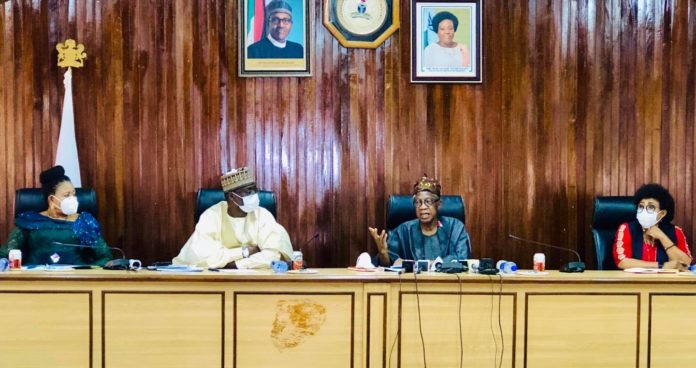TEXT OF THE PRESS CONFERENCE JOINTLY ADDRESSED BY THE HON. MINISTER OF INFORMATION AND CULTURE, ALHAJI LAI MOHAMMED, AND THE HON. MINISTER OF WATER RESOURCES, ENGR. SULEIMAN ADAMU, ON THE NATIONAL WATER RESOURCES BILL 2020, IN ABUJA ON TUESDAY, 22 SEPT. 2020
Good afternoon gentlemen of the press, and thank you for honouring our invitation to this press conference.
2. I am sure you have all been following the controversy that has trailed the National Water Resources Bill 2020, which is currently making its way through the National Assembly. Critics have, among other things, accused the Federal Government of having a hidden agenda by pursuing the Bill. We will address the misgivings of the critics in the course of this press conference. But first, let’s talk about the Bill.
3. Gentlemen, there is nothing new about the National Water Resources Bill. This is because it is an amalgamation of Water Resources Laws that have been in existence for a long time. These are:
– Water Resources Act, Cap W2 LFN 2004
– The River Basin Development Authority Act, Cap R9 LFN 2004
– The Nigeria Hydrological Services Agency (Establishment) Act, Cap N1100A, LFN 2004
– National Water Resources Institute Act, Cap N83 LFN 2004
4. So, why are the laws being re-packaged as the National Water Resources Bill 2020? The answer is that they are being re-enacted with necessary modifications to bring them in line with current global trends as well as best practices in Integrated Water Resources Management (IWRM). The overall objective of this amalgamation is the efficient management of the Water Resources Sector for the economic development of Nigeria and the well-being of its citizens.
5. The Bill provides for professional and efficient management of all surface and ground water for the use of the people (i.e. for domestic and non-domestic use, irrigation, agricultural purposes, generation of hydro-electric energy, navigation, fisheries and recreation). The Bill will ensure that the nation’s water resources are protected, used,
developed, conserved, managed and controlled in a sustainable manner for the benefit of all persons. Among other benefits, the Bill:
– provides for the creation of an enabling environment for public and private sector investment
– provides for capacity building processes to foster good governance
– Establishes water use and licensing framework to ensure sustainable financing for Water Sector Development from tariffs.
6. With the above stated lofty goals, one is then compelled to ask:
why has the Bill generated so much controversy? The first thing to say is that many of those criticising the Bill have not even bothered to read its provisions, thus depending on second-hand information to reach their conclusions. Those who have read it have perhaps done so perfunctorily. We have therefore decided to look at the main arguments against the Bill by the critics and respond to them, with a view to clearing any misgiving and also enlightening Nigerians.
a) Critics contend that with the Bill, the Federal Government is poised to take over the nation’s water resources by licensing and
commercializing the use of water.
Our Response: This is not the intention, because the current Water Resources Act, 2004 (made pursuant to the Constitution) already makes provision for this. This Bill is only trying to provide a framework for implementing that provision. The Regulatory provisions of the Bill require that commercial borehole drillers obtain a Licence. The Code
of Practice for Water Well Drillers issued by the Standards Organization of Nigeria (SON) and the NWRI in 2010 already requires
this. The Code provides Technical requirements that a driller must possess to undertake drilling as well as information on each such borehole to be provided to the national database. That Code however requires the License to be issued by the NWRI in Kaduna. This Bill provides for such Licenses to now be issued by the States, under delegation of the National regulator, the Water Resources Regulatory Commission.
Please note that borehole regulation is an international standard for abstraction of large volumes of water. Most countries in Africa, and
almost every developed country, regulates commercial abstraction. It is also important to note that there is no requirement for licensing
domestic abstraction. Regulating abstraction of large volumes of water is necessary, because groundwater abstraction is an activity that has environmental and ecological impact.
b) Critics contend that with the Bill, Nigerians will be prevented from access to potable water, hinging their argument on Section 75
which states that ”subject to the provisions of this Bill, no borehole driller, whether corporate or individual, shall commence borehole drilling business in Nigeria unless such driller has been issued a Water Well Driller’s licence by the Commission”.
Our Response: Why is a technically-competent driller afraid of obtaining a Licence? It is a Licence to practice, just as a medical Licence or any other Licence to be obtained by people professing to have the technical competence to do something. Most collapsed boreholes are drilled by charlatans. It is therefore incumbent on the government to prevent this.
On the provision of potable water, this is the responsibility of State governments. The National Policy for water resources prioritizes
abstraction for water treatment in the allocation of water use. This means that abstraction quantities required by state water Boards are given priority in water allocation and the financing of infrastructure by the Federal government for water development. Boreholes are the same. Sections 76-79 of the Bill clearly provides that the States will
undertake this regulation under a national framework provided by the regulator to ensure homogenous policy implementation.
c) Critics contend that the Bill is illegal, citing the Supreme Court which held that the power of physical planning in any state of the
Federation is exclusively vested in the state government and that the National Assembly lacks power to legislate on the physical planning outside the FCT.
Our Response: Well, this is not a Physical Planning Bill. This Bill only relates to the management of water resources that crosses state boundaries. The Constitution already grants the Federal Legislature this responsibility (item 64, Exclusive Legislative List, CFRN 1999).
The Water Resources Act, 2004 lists the water bodies to which the Act applies. This is maintained in the Bill. The interaction of the Federal government with the State is only as it concerns the management of the inter-state water that passes through the State. The Bill does not apply to water that is wholly within the boundaries of a State. The Bill also does not apply to Land. It clearly states that Land required by any of the institutions established in the Bill will be obtained in accordance with the Land Use Act (i.e with Governor’s consent).
d) Critics contend that based on the Supreme Court ruling, the provision of the Bill seeking to confer power on the Federal Government to give approval or licence for digging boreholes in any pact of the country is illegal and unconstitutional.
Our Response: Well, to the best of our knowledge, there is no court ruling on this. If there is, we are not aware that a case on borehole licensing has been decided by the Supreme Court.
e) Critics contend that the Bill, when passed into law, will clip the wings of state and local government authorities, as well as individuals, from making use of the water in their backyards without permission from Abuja
Our response: Communities on River Banks are guaranteed undisturbed use of water as stated in Section 3 of the Bill. Also, all occupiers of Land are guaranteed the right of abstraction for domestic and sustenance, whether by borehole or rivers. Section 3 reiterates the right of persons to continue to access water without charge for subsistence and preserves existing customary rights to water. (see Sections 1, 2, and 3 of the Bill). Section 2 of the Water Resources Act, 2004 is reproduced. This section protects the right of persons to use water for domestic purposes without charge and recognises the right of a holder of customary or statutory right of occupancy to access water for personal and household use but not for commercial
purposes.
f) Critics contend that the Bill is aimed at taking the resources of a certain part of the country for the use of herders. In other words,
that the Federal Government is seeking to implement RUGA by subterfuge.
Our Response: This is not the intent of the Bill and it is not even possible, as the Bill reiterates the fact that Land can only be acquired by any of the institutions established in accordance with the Land Use Act. Almost all the Institutions have State Representatives.
The Regulatory Commission Board comprises representatives of the six-geo political regions. The State level basins management includes
representatives of each state in the Basin.
G) Finally, critics contend that the Bill is capable of triggering ‘water wars’ .
Our Response: The misrepresentation of the contents and intent of the Bill is a real cause for concern. The framework for managing and
regulating inter-state waters that is represented in the Water Resources Policy, 2016 and this Bill are similar (in some cases
verbatim) with most international conventions and studies. It is the same as in South Africa, Ghana, Sierra Leone, Zimbabwe, and most
developed Federal constitutions.
‘Water Wars’ are more likely to happen between countries, while internal conflicts on water occur typically between states in a
country. So it is not correct to say the Bill is capable of triggering ‘water wars’. Plus, the Bill contains provisions that will ensure that
internal conflict on water is averted.
A possible source of internal conflict on water is if an upstream State decides to dam an inter-state water, thereby preventing it from
following its natural course, thus affecting downstream users. On the contrary, the Bill is the only panacea to internal conflict on water.
For example, River Niger passes several states before emptying into the Gulf of Guinea through the Delta. If any of the states dams it, that can trigger water conflict. The Bill has taken this into consideration. It provides, in Section 2 (3) for the Federal Government’s right to the use and management control of all surface water and groundwater affecting more than one state pursuant to the provisions of the Constitution of the Federal Republic of Nigeria 1999, as amended. Contrary to what is being perpetuated, water resources in a state that do not go beyond the particular state are
not regulated by this Bill.
7. Gentlemen, you can now see that many of those condemning the National Water Resources Bill 2020 either have not read it or do not understand its provisions. Also, we cannot rule out deliberate mischief by some of those who have been portraying the Bill as a new source of conflict. We are therefore using this opportunity to appeal to Nigerians to avail themselves of the provisions of the Bill to
avoid being misled by those who have chosen to politicize it. We also want to state that the Bill is for the good of the nation, and has no
hidden agenda whatsoever.
8. Finally, when passed into law, the National Water Resources Bill 2020 will provide for the enhancement of the Nigeria Water Sector, in
line with global best practices.
9. I thank you for your kind attention.






